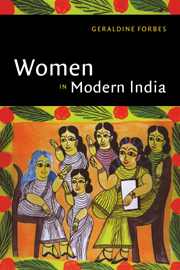Book contents
- Frontmatter
- Introduction
- 1 Reform in the nineteenth century: efforts to modernize women's roles
- 2 Education for women
- 3 The emergence of women's organizations
- 4 The movement for women's rights
- 5 Women in the nationalist movement
- 6 Women's work in colonial India
- 7 A time of transition
- 8 Women in independent India
- Bibliographic essay
- Index
- THE NEW CAMBRIDGE HISTORY OF INDIA
- References
7 - A time of transition
Published online by Cambridge University Press: 28 March 2008
- Frontmatter
- Introduction
- 1 Reform in the nineteenth century: efforts to modernize women's roles
- 2 Education for women
- 3 The emergence of women's organizations
- 4 The movement for women's rights
- 5 Women in the nationalist movement
- 6 Women's work in colonial India
- 7 A time of transition
- 8 Women in independent India
- Bibliographic essay
- Index
- THE NEW CAMBRIDGE HISTORY OF INDIA
- References
Summary
By the mid-1940s the all-India women's organizations had lost their hegemony. For almost two decades the women's organizations spoke for all Indian women. They demanded the trappings of ‘modern life’: education, health care, protective legislation, and civil and political rights within the framework of a social feminist ideology that constructed women as socially and psychologically different from men. They acknowledged India's special problems, especially child marriage, purdah, and the oppression of widows, and agreed that these practices made reform doubly hard. But in their view two things gave reform its impetus. First, these customs had not existed in India's ‘golden age.’ Second, as Indian women, they were blessed with a legacy of goddesses and heroines who willingly sacrificed themselves for husbands and families. This habit of sacrifice was now valorized as worthy of extension to civil society and the nation. These organizations had been nurtured by two opposing forces: nationalist aspirations and colonial domination. Their vision of modernized women threatened neither the patriarchy of the British rulers nor the patriarchy of Indian nationalists.
The ideology of the women's organizations was too Hindu, too middle-class, and too urban to appeal to or adequately represent all Indian women. An informal survey completed in 1932 estimated that 90 percent of Indian women were wage-earners and only ‘married women among the well-to-do families and those of higher social standing do not work for wages.’ Muslim women, unless they could agree to a secular-Hindu national project, were not adequately represented. Urban and rural working women took part in patriotic demonstrations but they were never fully integrated into the women's organizations.
- Type
- Chapter
- Information
- Women in Modern India , pp. 189 - 222Publisher: Cambridge University PressPrint publication year: 1996

